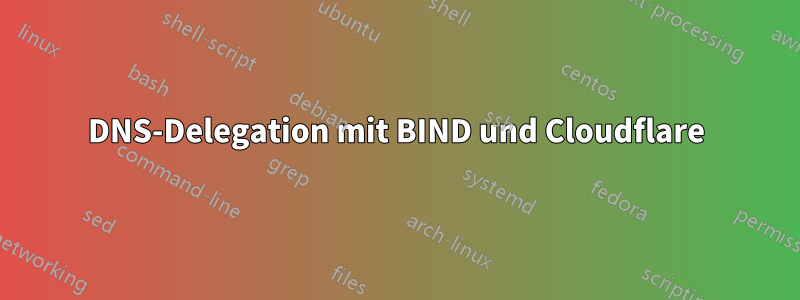
wahrscheinlich nur eine gewöhnliche Frage, aber ich habe monatelang Stunden damit verschwendet. Wenn Sie andere Protokolle/Ausgaben/Erklärungen usw. benötigen, fragen Sie einfach :)
Dank im Voraus!
Was ich brauche
- Die Zone
local.example.comsoll von einem lokalen Server verwaltet werden10.20.0.9 - Die lokalen Server (10.20.0.0/24) sind nur innerhalb des Netzwerks erreichbarAber
- Ihre Hostnamen
xxx.local.example.comsind weltweit vom Internet aus auflösbar
Was ich bisher habe
Ich verwende CloudFlare als DNS-Anbieter und folgedieser Leitfadenhabe ich folgendes eingerichtet:
- Aufzeichnungen bei CloudFlare:
ns.example.com A 10.20.0.9 (local DNS server) loc.example.com NS ns.example.com (delegation to local DNS) - Datensätze auf meinem lokalen DNS-Server (
10.20.0.9mit bind9)loc.example.com. IN SOA ns.example.com. hostmaster.example.com. ( 1628517915 3600 600 24H 3600 ) s1.loc.example.com. IN A 10.20.0.9
Mein Problem
CloudFlare beantwortet meine NS-Suchanfrage nicht loc.example.comwie ns.example.comerwartet. Stattdessen schlägt die Anfrage einfach mit „Serverfehler“ fehl (siehe letztes CLI-Protokoll) …
CLI-Ausgabe
dig ns.example.com; <<>> DiG 9.11.5-P4-5.1+deb10u5-Debian <<>> ns.example.com ;; global options: +cmd ;; Got answer: ;; ->>HEADER<<- opcode: QUERY, status: NOERROR, id: 10036 ;; flags: qr rd ra; QUERY: 1, ANSWER: 1, AUTHORITY: 0, ADDITIONAL: 1 ;; OPT PSEUDOSECTION: ; EDNS: version: 0, flags:; udp: 1232 ;; QUESTION SECTION: ;ns.example.com. IN A ;; ANSWER SECTION: ns.example.com. 300 IN A 10.20.0.9 ;; Query time: 111 msec ;; SERVER: 1.1.1.1#53(1.1.1.1) ;; WHEN: Mon Aug 09 16:42:06 CEST 2021 ;; MSG SIZE rcvd: 66Der Nameserver wird also in unsere lokale IP aufgelöst, super!
dig @10.20.0.9 NS loc.example.com; <<>> DiG 9.11.5-P4-5.1+deb10u5-Debian <<>> @10.20.0.9 NS loc.example.com ; (1 server found) ;; global options: +cmd ;; Got answer: ;; ->>HEADER<<- opcode: QUERY, status: NOERROR, id: 47653 ;; flags: qr aa rd ra; QUERY: 1, ANSWER: 1, AUTHORITY: 0, ADDITIONAL: 1 ;; OPT PSEUDOSECTION: ; EDNS: version: 0, flags:; udp: 4096 ; COOKIE: 7fa7e218d1c20f1e113b236e61113fb96c1b101d374cbde7 (good) ;; QUESTION SECTION: ;loc.example.com. IN NS ;; ANSWER SECTION: loc.example.com. 3600 IN NS ns.example.com. ;; Query time: 1 msec ;; SERVER: 10.20.0.9#53(10.20.0.9) ;; WHEN: Mon Aug 09 16:46:17 CEST 2021 ;; MSG SIZE rcvd: 96Unser lokaler DNS-Server weiß, dass er für die Subdomäne zuständig ist
dig @10.20.0.9 s1.loc.example.com; <<>> DiG 9.11.5-P4-5.1+deb10u5-Debian <<>> @10.20.0.9 s1.loc.example.com ; (1 server found) ;; global options: +cmd ;; Got answer: ;; ->>HEADER<<- opcode: QUERY, status: NOERROR, id: 38039 ;; flags: qr aa rd ra; QUERY: 1, ANSWER: 1, AUTHORITY: 1, ADDITIONAL: 1 ;; OPT PSEUDOSECTION: ; EDNS: version: 0, flags:; udp: 4096 ; COOKIE: 7790b2d359140e5f04be8596611140927c7321fefc1fbbe9 (good) ;; QUESTION SECTION: ;s1.loc.example.com. IN A ;; ANSWER SECTION: s1.loc.example.com. 3600 IN A 10.20.0.1 ;; AUTHORITY SECTION: loc.example.com. 3600 IN NS ns.example.com. ;; Query time: 1 msec ;; SERVER: 10.20.0.9#53(10.20.0.9) ;; WHEN: Mon Aug 09 16:49:54 CEST 2021 ;; MSG SIZE rcvd: 119Damit der lokale DNS unsere lokalen Hosts auflösen kann
dig @1.1.1.1 NS loc.example.com; <<>> DiG 9.11.5-P4-5.1+deb10u5-Debian <<>> @1.1.1.1 NS loc.example.com ; (1 server found) ;; global options: +cmd ;; Got answer: ;; ->>HEADER<<- opcode: QUERY, status: SERVFAIL, id: 33748 ;; flags: qr rd ra; QUERY: 1, ANSWER: 0, AUTHORITY: 0, ADDITIONAL: 1 ;; OPT PSEUDOSECTION: ; EDNS: version: 0, flags:; udp: 1232 ; OPT=15: 00 16 ("..") ;; QUESTION SECTION: ;loc.example.com. IN NS ;; Query time: 12 msec ;; SERVER: 1.1.1.1#53(1.1.1.1) ;; WHEN: Mon Aug 09 16:51:45 CEST 2021 ;; MSG SIZE rcvd: 57Hier liegt das Problem:CloudFlare antwortet NICHT auf unsere NS-Datensatzanfrage. Warum :o?


